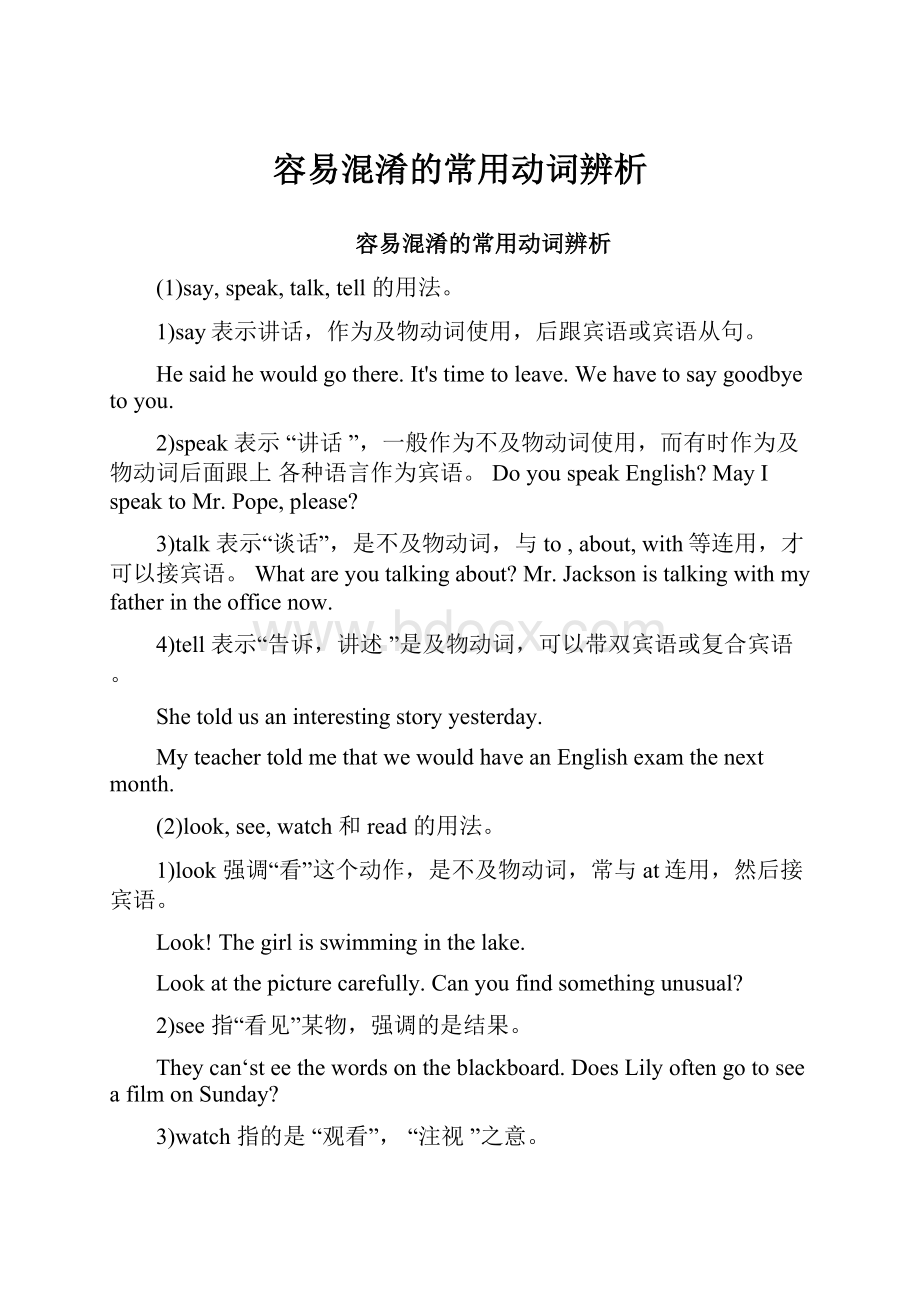容易混淆的常用动词辨析.docx
《容易混淆的常用动词辨析.docx》由会员分享,可在线阅读,更多相关《容易混淆的常用动词辨析.docx(18页珍藏版)》请在冰豆网上搜索。

容易混淆的常用动词辨析
容易混淆的常用动词辨析
(1)say,speak,talk,tell的用法。
1)say表示讲话,作为及物动词使用,后跟宾语或宾语从句。
Hesaidhewouldgothere.It'stimetoleave.Wehavetosaygoodbyetoyou.
2)speak表示“讲话”,一般作为不及物动词使用,而有时作为及物动词后面跟上各种语言作为宾语。
DoyouspeakEnglish?
MayIspeaktoMr.Pope,please?
3)talk表示“谈话”,是不及物动词,与to,about,with等连用,才可以接宾语。
Whatareyoutalkingabout?
Mr.Jacksonistalkingwithmyfatherintheofficenow.
4)tell表示“告诉,讲述”是及物动词,可以带双宾语或复合宾语。
Shetoldusaninterestingstoryyesterday.
MyteachertoldmethatwewouldhaveanEnglishexamthenextmonth.
(2)look,see,watch和read的用法。
1)look强调“看”这个动作,是不及物动词,常与at连用,然后接宾语。
Look!
Thegirlisswimminginthelake.
Lookatthepicturecarefully.Canyoufindsomethingunusual?
2)see指“看见”某物,强调的是结果。
Theycan‘steethewordsontheblackboard.DoesLilyoftengotoseeafilmonSunday?
3)watch指的是“观看”,“注视”之意。
ThetwinsarewatchingTVnow.Hewillgotowatchavolleyballmatch.
4)read指“看书”、“看报”、“阅读”之意。
Don‘treadinthesun.IliketoreadnewspaperswhenIamfree.
(3)borrow,lend和keep的区别。
1)borrow意思为“借入”,常常与from连用,是非延续性动词,表示瞬间即能完成的动作。
Meimeiborrowedabookfromthelibraryjustnow.
MayIborrowyourdictionary?
2)lend是“借出”之意,常常与to连用,同borrow一样,是非延续性动词,只表示瞬间即能完成的动作。
UncleWanyhaslenthiscartoMr.Li.Couldyoulendusyourradio,please?
3)keep是“保存”的意思,动作可以延续。
Howlongcantherecorderbekept?
Thefarmerkeptthepatfortwoweeks.
(4)bring,take,carry和get的用法。
1)bring意思为“拿来”、“带来”。
指将某物或某人从别处“带来”。
Bringmethebook,please.MayIbringJimtoseeyounextSaturday?
2)take意思是“拿走”,“带走”,把某物或某人从这里“带来”或“拿到”某处之意。
Itlookslikerain.Takearaincoatwithyou.Mothertookthelittlegirltothenext
room.
3)carry是“带着、搬运、携带”的意思,指随身携带,有背着、扛着、抱着、提着的含义,不表明来去的方向。
Doyoualwayscarryahandbag?
Theboxisheavy.Canyoucarryit?
4)get是去某处将某物拿回来。
Pleasegotomyofficetogetsomechalk.Thereisnowaterinthebottle.Whynotgetsome?
(5)wear,puton和dress的区别
1)wear是“穿着”戴“着”的意思,可以用于穿衣服、穿鞋、戴帽子、戴手套、佩戴首饰等,强调“穿着”的状态。
Tomalwayswearsblackshoes.Hewearsaraincoatevenwhenitisfine.
Shedoesn'tliketoweararedflowersinherhair.
2)puton是“穿上”戴“上”的意思,可以用于穿衣服、穿鞋、戴帽等。
着重于穿戴的动作。
It'scold.You'dbetterputonyourcoat.
Heputonhishatandwentoutoftheroom.
3)dress可以作及物动词和不及物动词,有“穿着”打“扮”的意思。
作“穿着”解时,只用于穿衣服,不用于穿鞋、戴帽、戴手套。
作为及物动词用时,它的宾语是人,不是衣服。
dresssb.(给某人穿衣服),而wear作“穿着”用时,也是及物动词,但它的宾语是物,不是人,即wearsth.(穿着衣物)。
Shealwaysdresseswell.Getupanddressquickly.
Maryisdressingherchild.
(6)take,spend和use的用法。
1)take指做某事用多少时间,句型是:
Ittakes/took/willtake+sb.+sometime+todosth.
Ittookmethreedaystofinishthework.Itwilltakeyouawhileweektotravel
throughtheforest.
2)spend指某人在某事(物)上花费时间或钱。
句型是:
Someonespends+money/time+onsomething(in)doingsth.
Shespentmorethan500yuanonthatcoat.
Hedidn‘tspendmuchtimeonhislessons.Hespentmuchtime(in)correctingstudents'exercises.
3)use表示使用工具、手段等。
Doyouknowhowtousethecomputer?
Shallweuseyourcar
(7)reach,get和arrive的区别。
1)reach是及物动词,后面要直接跟表示地点的名词作宾语。
Afterthetrainhadleft,theyreachedthestation
Wereachedthetopofthemountainatlast.
2)get是不及动词,常与to连用,再接名词,后面接表示地点的副词时,不用to,getto常用于口语中。
Whenthestudentsgottothecinema,thefilmhadbegun.
Mysisterwascookingwhenmothergothome.
3)arrive是不及物动词,表示到达一个小地方时,用arriveat,到达一个大地方时用arrivein。
Thesoldiersarrivedatasmallvillage
TheforeignerswillarriveinShanghaitomorrow.
1.[误]Shelaiddownandsoonfellasleep.
[正]Shelaydownandsoonfellasleep.
[析]考试中常出现的是易混动词lay放,lie躺,lie说谎。
它们的过去时、过去分词和现在分词变化如下:
lay(放)laid,laid,laying(及物动词)
lie(躺)lay,lain,lying(不及物动词)
lie(说谎)lied,lied,lying
2.[误]Pleaseriseyourhand.
[正]Pleaseraiseyourhand.
[析]rise是不及物动词,其后不能接宾语,如:
Thesunrisesintheeast而.raise是及物动词。
3.[误]Iliketoswimverymuch,butIdon'tlikeswimmingthisafternoon.
[正]Ilikeswimmingverymuch,butIdon'tliketoswimthisafternoon.
[析]like作为"喜欢"讲时,可以接动名词也可以接不定式,但接动名词时多表达一种习惯性动作。
而接不定式则侧重于表达一次性、特殊性的动作。
但要注意的是like与would连用时则一定要接不定式,如:
Wouldyouliketogowithme?
再有一点要注意的是,like作为介词"像"讲时,只能用分词作其宾语。
4.[误]Stop!
Didyoulistentoastrangevoice?
[正]Stop!
Didyouhearastrangevoice?
[析]hear的侧重点是听到、听见什么,而listento的侧重点为听的倾向,如:
listen!
Doyouhearsomeonecallinghelp?
这样的词还有look与see。
它们的侧重点也不同,look重于"看"的倾向,而see重于看见没看见。
5.[误]Didyouwatchsomefilmrecently?
[正]Didyouseesomefilmrecently?
[析]英语中see与watch各有不同的用处,see用于看电影、剧目,而watch用作看电视和看球赛。
6.[误]Look.Abeautifullamphangedfromtheceiling.
[正]Look.Abeautifullamphungfromtheceiling.
[析]hang有两个含义,①"挂",它的过去时与过去分词是hung,hung;②"绞刑",这时它是规则动词,其过去式与过去分词则为hanged,hanged。
7.[误]HowlongcanIborrowthisbook?
[正]HowlongcanIkeepthisbook?
[析]"借"在英文中有三个词,①借入,即borrow,如:
MayIborrowsomebooksfromthelibrary?
②借出,如:
Icanlendmybiketoyou.③借多久要用keep,因为borrow与lend都是截止性动词,而keep是延续性动词。
如HowlongcanIkeepit?
8.[误]Wehavewonyourclass.
[正]Wehavebeatenyourclass.
[析]win是及物动词,其后面的宾语应是比赛、战争、奖品、奖金。
而beat的宾语,应是人、队、班级等等,如:
Wewonthegame.
9.[误]Ileftmykey.
[正]Iforgotmykey.
[正]Ileftmykeyathome.
[析]leave是"丢下",其后一定要接地点状语,而forget其后不要接地点状语。
10.[误]Oh!
It'srainingoutside.Pleasebringtheraincoatwithyou.
[正]Oh!
It'srainingoutside.Pleasetaketheraincoatwithyou.
[析]bring为“带来”如:
Nexttimebringyourlittlesisterhere.而take为“带走”,fetch为“去某处取什么回来”,如:
Pleasefetchsomecoffeeforus要熟记的
是在初中课文中与take有关的词组,如:
takeaway拿走takeback收回takedown取下takeoff脱下take⋯out拿出takepartin参加takeaseat坐下takeone‘splace替代takealook看看taketurn轮流takeamessage捎信takecareof照看takeone'stemperature测量体温
11.[误]Thepolicemanreachedtohishome.
[正]Thepolicemanreachedhishome.
[析]reach作“到达”讲时是及物动词,如:
Ireachedthehotelat8∶30作为"到达"讲时还有arrive(in+大地方)(at+较小的地方)和getto.要注意的是与get有关的词组有:
getback回来getin收割getinto进入getoff下车geton上车getout出去getup起床getto到达getreadyfor=bereadyforgetonwellwith与人相处融洽get加比较级为变得如何,例如:
getcolder
andcolder.
12.[误]Thisdictionaryspentmefivedollars.
[正]Thisdictionarycostmefivedollars.
[析]英文中的"花费"有4个spend,cost,take和pay,其中spend与pay所在句中的主语应为人,如:
Ispenttwohoursindoingmyhomework.Ipaidfivedollarsforthebook.而cost与take的主语则是事物,如:
Ittakesmetwoyearstofinishthisbook.
13.[误]InsummerIalwayssleepwiththewindowsopened.
[正]InsummerIalwayssleepwiththewindowsopen.
[正]Ialwayssleepwiththewindowsclosed.
[析]要注意open是动词也是形容词,而close则要用其过去分词作形容词。
14.[误]Pleasewaitaminute.I'mhavingonmyclothes.
[正]Pleasewaitaminute.I'mputtingonmyclothes.
[析]英语中的穿衣服要分状态,是什么样的穿着打扮,还是穿衣服的动作两类动词。
表示穿着状态的词有haveon,wear在,用法上haveon不宜用进行时态,它多用一般时态,如:
Shehasonanewschooldress.而wear则多用进行时来表示状态,如:
Sheiswearinganewsweate在r.表示动作的词中puton是常用的一词。
dress用作动词当"穿衣"讲时其后宾语不应接衣物,而要接人,如:
Mychildrenwereveryyoungtheycouldn'tdressthemselves.在表示穿着状态时用其过去分词当形容词,如:
Heisdressedinwhite.
15.[误]Mycomputercan'tbegin.Couldyoufindsomeonetohelpme?
[正]Mycomputercan'tstart.Couldyoufindsomeonetohelpme?
[析]begin与start均可指"开始",而且常常可以互换,如:
Schoolbegins(starts)at8a.m.但是在两种情况下不宜用begin而要用start,①当作机器开动、发动讲,如:
Mycarcan'tstart.Theremustbesomethingwrongwithit.②作为"旅途开始"讲,如:
Weshouldhavetostartearly.Therewasalotoftrafficontheroad.
16.[误]I'mverygladbecauseIhavefoundedmylostkey.
[正]I'mverygladbecauseIhavefoundmylostkey.
[析]find是不规则动词,它的过去式和过去分词是found,found,而found又是另外一词"建立",它是规则动词,其过去式与过去分词是founded,如:
ThePeople'sRepublicofChinawasfoundedin1949.
17.[误]Please.Let'sspeakinEnglish.
[正]Please.Let'sspeakEnglish.
[正]Please.Let'stalkinEnglish.
18.[误]CanyouspeakitEnglish?
[正]CanyousayitinEnglish?
[析]英文中“说”有4个常用词say,tell,speak,talk其.中不及物动词有speak和talk,如:
Iwanttotalkwithyou.Wearetalkingaboutthenewfilm.而speak其后接语言时是及物动词,其他情况是不及物动词。
say与tell是及物动词,其中tell常用双宾语,如:
Tellusastory.但用于讲实话或谎话时也用单宾语。
如:
Tellthetruth.
19.[误]Areyoulookforyoubook?
[正]Areyoulookingforyoubook?
[析]此句含助动词are,且是主动语态,因此look的后面应该加ing。
在初中阶段学习与for有关的词组有:
askfor请求carefor关心lookfor寻找waitfor等待sendfor
请人payfor付款searchfor寻找leavefor去某地preparefor准
备thanksomebodyforsomething为某事向某人道谢。
20.[误]Areyouunderstandingit?
Yes,Igotit.
[正]Doyouunderstandit?
Yes,Igotit.
[析]understand这一词没有进行时态,如同感观动词love、hate⋯Igotit是美语,即Iunderstoodit。
要记住get作为"到达"讲时是不及物动词,如:
I'llgettotheschoolat8a.m.初中范围常用与to有关的动词词组如下:
belongto属
于cometo苏醒pointto(at)指着getto到达lookforwardto期望agreeto同意
21.[误]Themeathasbecomebadly.
[正]Themeathasbecomebad.
[析]英语中go,get,become,turn作为转变时,其后接形容词,这时这些动词应被看作系动词。
22.[误]Theteachersaidtheearthmovedaroundthesun.
[正]Theteachersaidtheearthmovesaroundthesun.
[析]如果主句的谓语动词是现在时,其宾语从句可以是任何时态。
如果是过去时,则宾语从句中的时态应与之呼应。
但地球围绕太阳转是不随时间而变化的客观事实,所以还应用一般现在时态来表达。
23.[误]I'llcometoseeyouassoonasI'llbeback.
[正]I'llcometoseeyouassoonasIamback.
[析]在状语从句中要用一般时来表示将来,如:
Ishouldtellhimwhenhecameback.
24.[误]Iwanttoknowwhetheryoucometomypartytomorrowornot.
[正]Iwanttoknowwhetheryouwillcometomypartytomorrowornot.
[析]在宾语从句中则要用将来时表示将来的动作。
要注意的是如果宾语从句中仍有状语从句时,依然要用一般现在时表示将来,如:
Iwanttoknowifitrainstomorrowyou'llcomehereornot.
25.[误]Whatdidyoudoateightlastnight?
[正]Whatwereyoudoingateightlastnight?
[析]在描述过去某一具体时刻的动作或从某时到某时一段时间内正在进行的动作要用过去进行时,如:
IwaswashingclothesfromeighttillnoonlastSunday
29.[误]ThisisournewEnglishteacher.Hehasgonetomanyforeigncountries.[正]ThisisournewEnglishteacher.Hehasbeento